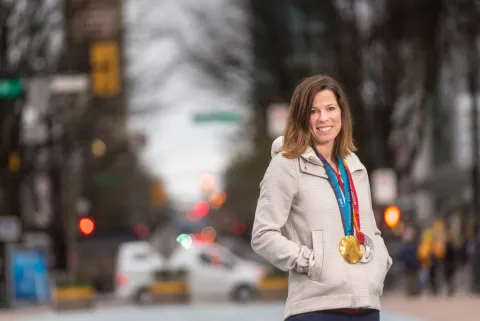Olympic speed skating champion now going for academic gold

Vancouver, Calgary and Sochi. Beijing, London and Rio. How does an Olympic host city fare after the fanfare fades and the stars and their adoring crowds go home? It’s a question that has fascinated Canadian long-track speed skating champion Christine Nesbitt for years.
The three-time Olympian hung up her skates just over two years ago, having won 124 international medals over a 12-year career, including individual gold at the Vancouver 2010 Winter Olympic Games. Now a full-time master’s student at UBC’s school of community and regional planning, she’s trained her sights beyond the podium and towards the somewhat mixed legacy many Olympics leave behind.
“The Olympics are a massive project with a hard deadline that doesn’t always allow host cities enough time to carefully plan and follow through with their legacy,” said Nesbitt. “Many go into debt to finance construction, there might be issues with how security is enforced, or lower-income people could be displaced in order to build Olympic facilities. And in some instances those facilities aren’t viable post-Games, making the situation worse.”
For her master’s thesis, Nesbitt has chosen to research these issues, focusing on Calgary where she trained for 12 years. The city hosted the Olympics in 1988 and is considering hosting the Olympics a second time, in 2026.
“There is growing awareness of the challenges around hosting the Olympics, but I want to see how host cities can mitigate negative impacts and create lasting benefits for local communities,” added Nesbitt. “In Calgary’s case there could be an opportunity, if it plays host city again, to create a different kind of legacy – perhaps affordable or social housing. Calgary has changed a lot these past 15 years so there is growing pressure on the housing market.”
Nesbitt pointed to the history of Vancouver’s former Olympic Village, which housed athletes during the 2010 games and struggled with following through on its social housing targets but ultimately provided the spark for further private investment in the area.
“As someone who has competed in the Olympics, I have seen the spirit and joy those two weeks can bring to host cities. I’d like to see how the Olympics might leave behind long-term, net positive legacies for the host communities.”
MEDIA: To schedule interviews with Christine Nesbitt contact lou.bosshart@ubc.ca